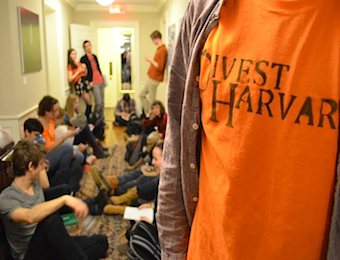Harvard’s fossil fuel divestment movement recently hit a snag.
Last week, a Massachusetts court dismissed a novel lawsuit brought by seven Harvard students seeking to make the university in Cambridge, Mass., divest its $36.4 billion endowment of holdings in major coal, oil and natural gas companies.
The students made two claims in the lawsuit. The first claim, filed on behalf of themselves, argued that divestment is justified under their interpretation of the school’s charter. The second claim, filed on behalf of future generations—people whose “future health, safety and welfare depends on current efforts to slow the pace” of man-made climate change—argued that the school was intentionally investing in a known dangerous activity and should be stopped.
Justice Paul Wilson disagreed. In his opinion, he wrote that the students “have brought their advocacy, fervent and articulate and admirable as it is, to a forum that cannot grant the relief they seek.”
The students filed the lawsuit in November 2014. Their goal is to force the school to sell off all of its stocks and bonds tied to fossil fuel companies.
In December, both Harvard and the state’s attorney general moved to dismiss the case. Hearings were held at the Suffolk Superior Court in Boston in late February.
Alice Cherry, a plaintiff in the case and a second-year law student at Harvard, told InsideClimate News that she and the other students plan to appeal. This is the first time students have attempted to use a lawsuit to force fossil fuel divestment. Cherry said she believes “lawsuits could be an important part of escalating the divestment movement going forward.”
Harvard spokesman Jeff Neal wrote in an email, “As the Court notes in its decision, Harvard has been, and continues to be, focused on supporting the research and teaching that will ultimately create the solutions to this challenge” and will continue to tackle the issue through these means.
Harvard students launched their divestment campaign back in 2012. In an October 2013 letter rejecting divestment, Harvard president Drew Faust wrote: “the endowment is a resource, not an instrument to implement social or political change.”
Karthik Ganapathy, a spokesman for the green group 350.org, which helped launch the fossil fuel divestment movement, told InsideClimate News that this argument doesn’t make sense. Historically, the university divested from tobacco companies and companies tied to apartheid in South Africa, he said.
Apart from the lawsuit, Harvard students have ramped up their actions in support of fossil fuel divestment in recent months. On Feb. 12, a group of students staged a sit-in in an administrative office. Since then, dozens of alumni, including actress Natalie Portman and author Cornel West, have signed a letter in support of divestment and a week of activities—dubbed “heat week”—supporting the movement in April.
Hampshire College in Amherst, Mass., was the first school to pledge to divest from fossil fuels, in December 2011. Since then, 28 schools worldwide have committed to divest and at least nine have already met their goals. Moreover, the trend has extended beyond academia—at least 41 cities, 72 religious institutions, 30 foundations and hundreds of individuals have also joined the cause.
According to 350.org, the primary argument for divestment is: “If it is wrong to wreck the climate, then it is wrong to profit from that wreckage.”
About This Story
Perhaps you noticed: This story, like all the news we publish, is free to read. That’s because Inside Climate News is a 501c3 nonprofit organization. We do not charge a subscription fee, lock our news behind a paywall, or clutter our website with ads. We make our news on climate and the environment freely available to you and anyone who wants it.
That’s not all. We also share our news for free with scores of other media organizations around the country. Many of them can’t afford to do environmental journalism of their own. We’ve built bureaus from coast to coast to report local stories, collaborate with local newsrooms and co-publish articles so that this vital work is shared as widely as possible.
Two of us launched ICN in 2007. Six years later we earned a Pulitzer Prize for National Reporting, and now we run the oldest and largest dedicated climate newsroom in the nation. We tell the story in all its complexity. We hold polluters accountable. We expose environmental injustice. We debunk misinformation. We scrutinize solutions and inspire action.
Donations from readers like you fund every aspect of what we do. If you don’t already, will you support our ongoing work, our reporting on the biggest crisis facing our planet, and help us reach even more readers in more places?
Please take a moment to make a tax-deductible donation. Every one of them makes a difference.
Thank you,







